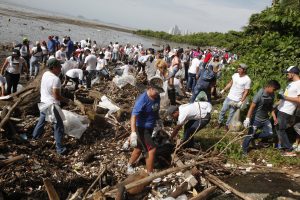Panama City, Sep 23 (EFE).- Thousands of Panamanians turned out on Sunday to clean local beaches with the aim of highlighting the serious environmental problem posed by pollution of the oceans and raising awareness of the importance of reducing the use and consumption of plastics.
“Hurry, I need more hands to lift this net!” shouted one young man, sweating as he and a group of friends tried to get a gigantic discarded fishing net into a trash container.

This is a scene that has been repeated each year for more than two decades on 70 beaches near the Panamanian capital and in the provinces of Darien, Veraguas and Cocle with the participation of environmental organizations, public institutions and large companies.
The director of Environmental Education for the non-governmental National Association for the Conservation of Nature (ANCON), Jenny Echevarria, told EFE that there are four big rivers that flow through the city from north to south and that end up carrying all kinds of waste into Panama Bay.
“We’ve found washing machines, refrigerators, tires, toys, car parts, shoes, glass and mainly plastic bottles. We have a serious problem with plastic in Panama. People don’t understand the harm it causes to toss a plastic bottle on the ground,” she said.
The United Nations estimates that each year eight million tons of plastic are dumped into the sea, an average of a truckload of plastic each minute, and that annually one million birds and 1,000 sea turtles die as a result of that pollution.
According to figures compiled by the Panama Mayor’s Office, 19 percent of the waste from the capital vicinity is plastic. Organic waste represents an even larger quantity: 30 percent.
In January, Panama approved a groundbreaking law that will enter into force in January 2019 and prohibits the use of throwaway plastic bags in all commercial establishments.
“Each year, we collect between 60-90 tons of trash, but that’s just a bandaid. When the tide rises again, the beaches will be just as dirty. Trash is eating up our seas and is affecting an ecosystem that is essential for us: mangroves,” the activist said.
Mangroves cover just 1 percent of the total tropical forest area worldwide, but they absorb up to five times more CO2 and play a fundamental role in the life cycle of some fish and crustaceans and protect the coast from erosion, Echevarria said.
Panama has about 180,000 hectares (some 450,000 acres) of mangroves, but since the 1970s it has lost about 50 percent of the mangroves that it had at that time.
The UN calculates that, if things continue on their current course, by 2050 there will be more plastic than fish in the oceans.
